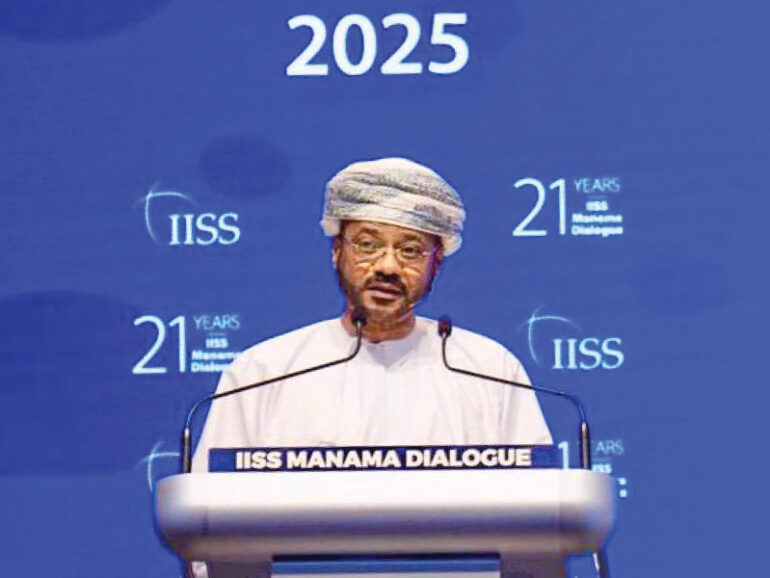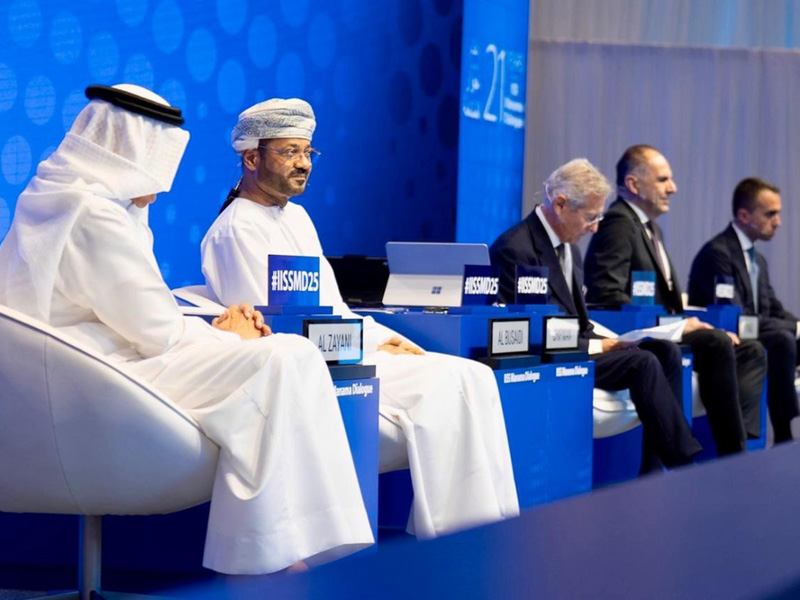 By OUR CORRESPONDENT
By OUR CORRESPONDENT
Muscat – H E Sayyid Badr bin Hamad al Busaidi, Foreign Minister, has called for regional security based on dialogue and cooperation rather than isolation or exclusion. Speaking at the Manama Dialogue 2025 in Bahrain on Saturday, he said past experiences show that marginalisation only deepens tensions and prolongs conflicts.
Full text of H E Sayyid Badr’s presentation at the Manama Dialogue:
“Excellencies, ladies and gentlemen, colleagues,
I extend my thanks to the Kingdom of Bahrain and the International Institute for Strategic Studies for organising this Dialogue. I am glad to be able to contribute.
Every year, this event provides an excellent platform for us to express views and listen to a variety of perspectives. This diversity of thought benefits us all, as we unite around the conviction that stability is fostered through dialogue.
True security cannot be achieved through policies of isolation, containment, and exclusion. True security requires inclusivity.
History proves this.
Since the revolution of 1979, Iran has been seen as a threat. It was believed that Iran sought to export its revolution and destabilise its neighbours, and that the best solution would be a policy in which Iran was isolated and contained.
In Oman’s view, this was never a solution.
Since around 1989, Iran has shown openness to rapprochement with the West and a desire to integrate into the regional status quo.
By engaging constructively with its neighbors, Iran could demonstrate that it is not a threat but a committed partner in fostering regional stability and cooperation.
During the invasion and occupation of Kuwait in 1990, Iran demonstrated considerable restraint. Oman saw this as a sign of its readiness to engage, and we advocated a collective and comprehensive regional security structure, optimistic that Iran might be included.
Looking back, I believe that if such a structure had been established, the war that followed in 2003 could have been prevented, and many lives could have been saved.
The policy of containment persisted, and Iran remained viewed as a threat and an outsider in its own region. No serious effort was made to include it in regional security dialogue.
The only positive developments in the following decades came through diplomatic and economic engagement. Exactly the kinds of engagement that the policy of containment resisted.
Earlier this year, Oman was hopeful that such engagement would again benefit regional security. During five rounds of US Iran nuclear talks, we made very substantial progress.
But just three days before the sixth and possibly decisive round of talks, Israel unleashed its bombs and missiles in an illegal and deadly act of sabotage.
This was shameful, but unfortunately it was not surprising. We have long known that Israel, not Iran,is the primary source of insecurity in the region.
Israel’s deliberate efforts to prolong tensions had, in this case, killed hundreds of Iranian civilians.
But Iran responded with remarkable restraint. Just as it had when Israel bombed its consulate in Syria, injured its ambassador to Lebanon, and assassinated a leading Palestinian negotiator in Tehran.
Over the years, the GCC has at best sat back and permitted the isolation of Iran. I believe this needs to change.
Oman has long hoped for a more comprehensive mechanism for dialogue with all states in the region, including Iran, and Iraq, and Yemen.
This would strengthen the security efforts of the GCC. It would reflect the fact that Iran also has a real and legitimate stake in the security of the Gulf.
And it would place us in a much better position to address other pressing challenges, such as maritime security, drug and human trafficking and climate change.
How can we have regional security if major regional players are excluded from the conversation?
Inclusive dialogue promotes harmony, mutual respect, and deeper economic ties, creating incentives for restraint that containment or zero- sum approaches cannot achieve.
Failing to engage constructively and in good faith with Iran, the Houthis, and others, will not resolve issues like proxy wars, human suffering, or nuclear proliferation.
On the contrary, exclusion fuels conflict, extremism, and instability, worsening these challenges.
Only an inclusive regional security framework can effectively address shared challenges, leverage collective resources, and pave the way for a more stable and prosperous future for our peoples.
Thank you.”

© 2021 Apex Press and Publishing. All Rights Reserved. Powered by Mesdac